For many dog lovers, the idea of sharing a home with a furry companion is delightful – until they consider the endless battle against shedding dog hair. Whether you’re an allergy sufferer, prioritize a clean living space, or simply prefer less maintenance, finding a small breed of dogs that don’t shed can be a game-changer. The good news is, a surprising number of adorable, compact breeds fit this bill, offering all the joy of dog ownership without the constant cleanup.
This comprehensive guide will walk you through various small dog breeds renowned for their minimal to non-existent shedding, helping you understand their unique traits, grooming requirements, and temperaments. Get ready to discover your ideal furry friend that won’t leave a carpet of hair behind! For those seeking specific traits like calmness in a non-shedding dog, you might explore calm small dog breeds that don’t shed.
Understanding “Non-Shedding” Dogs and Hypoallergenic Claims
It’s important to clarify that no dog is truly 100% “non-shedding.” All dogs lose some hair, just like humans do. However, certain breeds are classified as “non-shedding” or “hypoallergenic” because they shed significantly less than others, or their hair gets trapped in their coat rather than falling out. This greatly reduces the amount of dander (dead skin cells) and hair dispersed into the environment, making them much more suitable for individuals with allergies or those who prefer a cleaner home. Their coats often require regular professional grooming or diligent home care to prevent matting. If you are specifically looking for small dog breeds who don’t shed, this guide will provide excellent options.
Key Considerations When Choosing a Low-Shedding Small Dog
While minimal shedding is a wonderful trait, it’s just one piece of the puzzle. When selecting your perfect canine companion, consider the following:
- Grooming Needs: “Non-shedding” often translates to “high grooming.” Their coats grow continuously and require regular brushing, trimming, and bathing to prevent mats and maintain skin health.
- Temperament and Energy Levels: Do you prefer a quiet lapdog or an energetic playmate? Ensure the breed’s personality aligns with your lifestyle.
- Exercise Requirements: Even small dogs need daily walks and playtime to stay healthy and happy.
- Size: Small breeds vary significantly in size, from tiny toy breeds to slightly larger mini dogs.
- Training: All dogs benefit from consistent training and socialization.
Let’s dive into some of the best small dog breeds that don’t shed!
Affenpinscher: The Witty Wire-Haired Companion
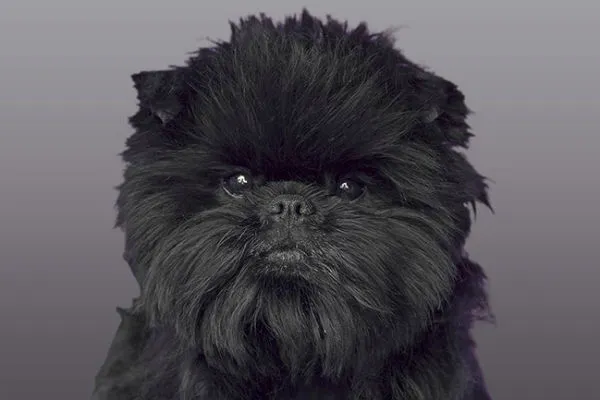 Affenpinscher dog with wiry coat looking curious
Affenpinscher dog with wiry coat looking curious
The Affenpinscher, whose name means “monkey-like terrier,” is a small but mighty breed with an intelligent and mischievous appearance. Despite their compact size, these Toy group dogs are fearless, making excellent little watchdogs. What’s even better for a clean home is their wiry coat, which sheds very little and has almost no typical “doggy odor.” A quick twice-weekly brushing with a slicker brush and comb is usually all it takes to keep an Affenpinscher looking neat and tidy. This low-maintenance canine is also celebrated for its endearing sense of humor, making them a delightful addition to any family.
Basenji: The Barkless, Low-Shedding Hound
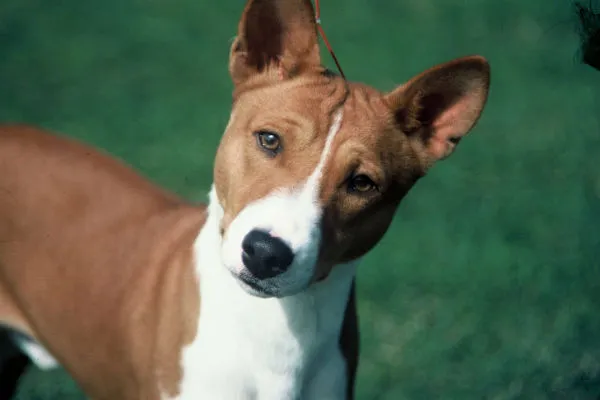 Basenji dog with short, fine coat standing alert
Basenji dog with short, fine coat standing alert
For those who admire the sleek appearance of hounds but wish to avoid their distinctive odor and shedding habits, the Basenji offers a perfect solution. This unique breed sheds very minimally, thanks to its short, fine coat that demands little more than occasional brushing. Basenjis are also famously quiet, often referred to as “barkless dogs,” making them an excellent choice for apartment living, provided they receive sufficient daily exercise and opportunities for play. Their independent yet affectionate nature makes them a captivating companion for experienced dog owners.
Bichon Frise: The Playful Powder Puff
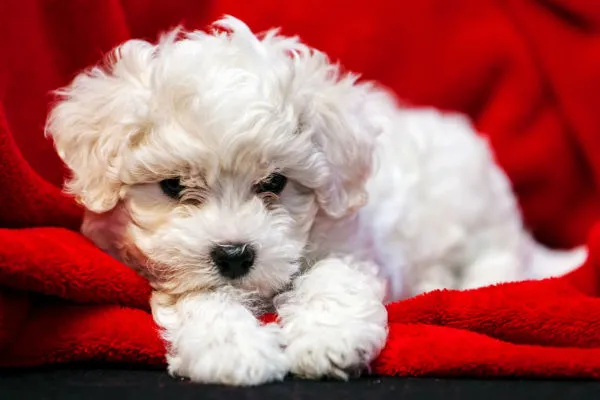 Bichon Frise dog with fluffy white coat looking happy
Bichon Frise dog with fluffy white coat looking happy
The Bichon Frise is truly a prime example of a non-shedding small dog breed. These delightful, affectionate, and playful dogs are an ideal choice for people with allergies because their hair grows continuously, trapping dander and preventing it from spreading. However, their beautiful powder-puff appearance is not maintenance-free. To keep their voluminous white coats free from mats and looking their best, frequent grooming, daily brushing, and regular baths are absolutely essential. Their cheerful disposition and loving nature make the grooming effort well worth it.
Bolognese: The Italian Lapdog with a Fluffy Coat
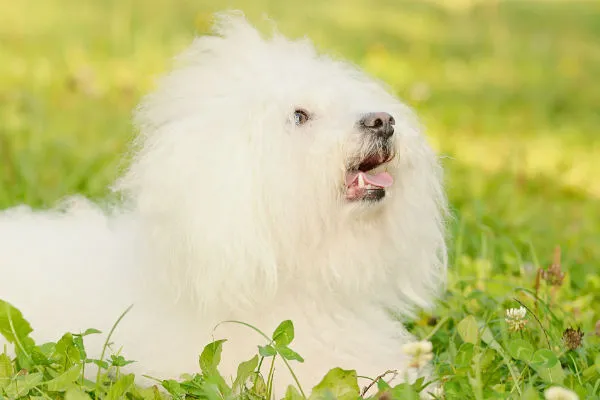 Bolognese dog with distinctive fluffy white coat
Bolognese dog with distinctive fluffy white coat
Similar to the Bichon Frise, the Bolognese boasts a distinctive fluffy white coat composed of hair rather than fur. This charming Italian lapdog does not shed in the traditional sense, but their dead hair must be brushed out regularly to prevent matting and maintain the coat’s pristine condition. Daily grooming is crucial for these lovable companions to ensure they always look their best. Bolognese dogs are known for their calm, devoted, and intelligent personalities, making them wonderful additions to quiet homes and families who can provide consistent attention.
Brussels Griffon: A Loyal Companion with Character
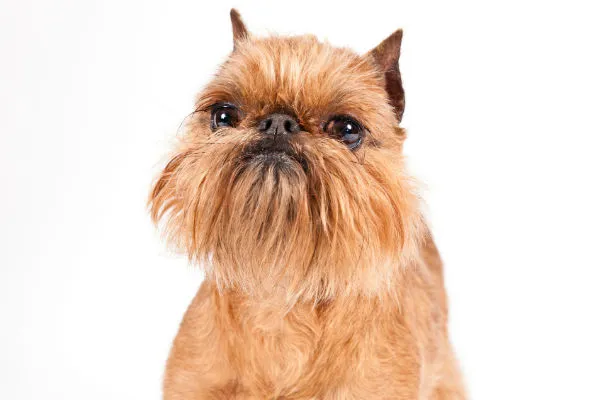 Brussels Griffon dog with intelligent expression
Brussels Griffon dog with intelligent expression
Despite their small stature, Brussels Griffons are robust dogs that do not require excessive pampering. Available in both smooth-coated and rough-coated varieties, both types are minimal shedders, thriving with regular grooming. Their compact size means that a daily walk combined with indoor play is typically sufficient to meet their exercise needs. This loyal and sensitive little dog forms strong bonds with its family and generally fares best in households where people are frequently home, ensuring they receive plenty of companionship and affection.
Chinese Crested: The Unique Hairless Wonder
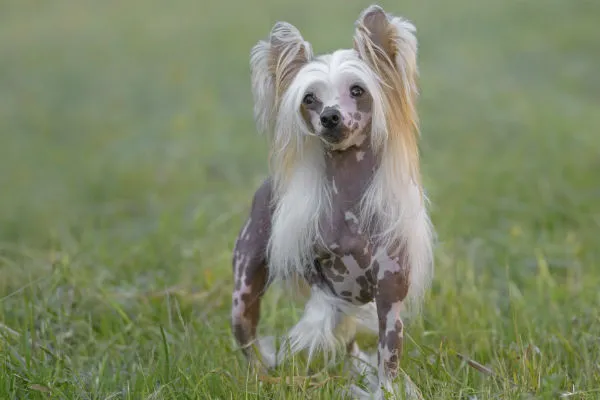 Hairless Chinese Crested dog showing unique features
Hairless Chinese Crested dog showing unique features
For those looking to entirely avoid shedding, the Chinese Crested offers a unique solution. This captivating breed comes in two distinct coat types: hairless and powderpuff. The Hairless variety typically has hair only on its head (crest), tail (plume), and feet (socks), while the Powderpuff is covered in a soft, fine coat of hair that sheds very minimally. Hairless dogs require special care and attention to their skin, as they are prone to sunburn and need protection from the cold. Regular moisturizing and sun protection are vital for their well-being. These elegant and playful dogs make loving and entertaining companions.
Coton De Tulear: The Royal Dog of Madagascar
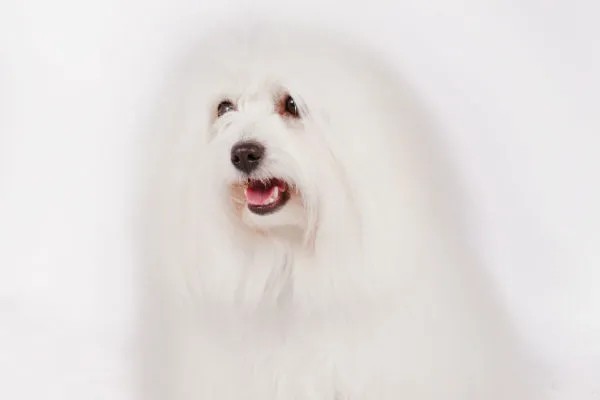 Coton de Tulear dog with long, fluffy white coat
Coton de Tulear dog with long, fluffy white coat
The Coton de Tulear, the official dog of Madagascar, is cherished for its distinctive, long, fluffy coat. This particular coat type is considered hypoallergenic, making it an excellent choice for allergy sufferers and anyone seeking a small breed of dogs that don’t shed. While their coat is beautiful, Coton de Tulear dogs do require daily grooming to keep it free from tangles and mats. Their lighthearted, gentle, and intelligent nature makes the grooming effort a small price to pay for such a devoted and charming companion.
Havanese: Cuba’s Charming Non-Shedder
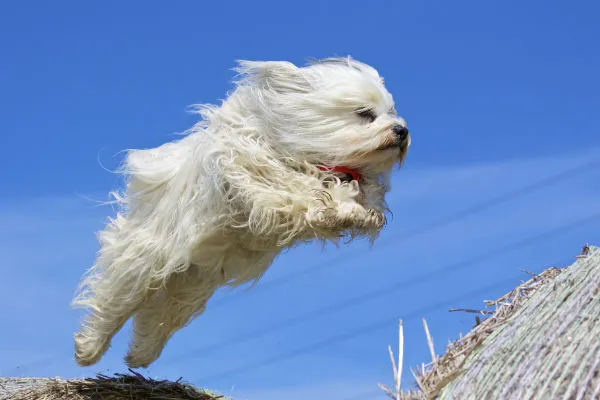 Havanese dog with long, wavy coat looking playful
Havanese dog with long, wavy coat looking playful
These lively and intelligent dogs, native to Cuba, delight their owners with patented spunky charm and a coat that doesn’t shed. This means less time spent lint-rolling furniture and more quality time romping around with the playful Havanese. While they are low-shedding, their long, silky coat requires weekly brushing and regular baths to maintain its cleanliness, health, and beautiful flow. Havanese are adaptable and social dogs, thriving on human companionship and making wonderful family pets. If you’re considering expanding your family with a similar playful breed, looking into toy cavachon puppies for sale near me could be an interesting option.
Maltese: The Ancient Aristocrat with Silky Hair
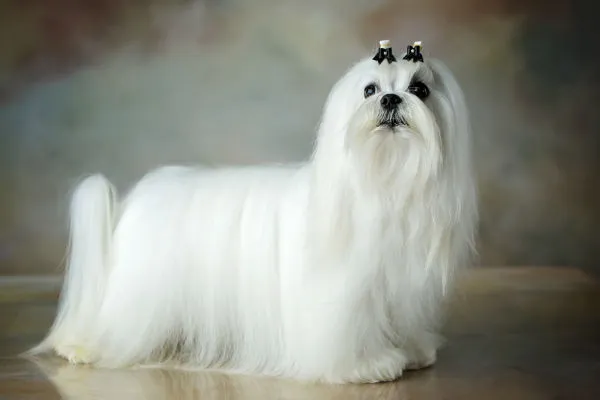 Maltese dog with long, white silky coat
Maltese dog with long, white silky coat
Maltese dogs have captivated human hearts for an impressive three millennia. This ancient dog breed from Malta has retained much of its original charm, partly due to its long, flowing white coat that sheds very little, making them an ideal lapdog. While minimal shedding, their coats require consistent care. Regular brushing is crucial to prevent mats from forming, and occasional baths are necessary to keep their long, silky hair clean and free of dirt and debris. Maltese are gentle, playful, and incredibly affectionate, thriving on attention and making wonderful indoor companions.
Lhasa Apso: The Zen Guardian from Tibet
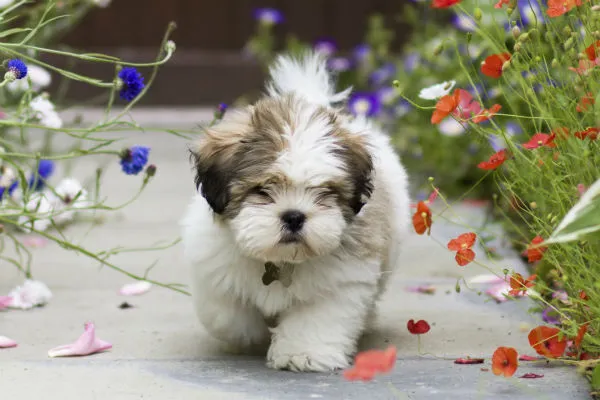 Lhasa Apso dog with long hair and calm demeanor
Lhasa Apso dog with long hair and calm demeanor
This small dog breed that doesn’t shed, originating from the mountains of Tibet, makes an excellent and loyal companion. The Lhasa Apso is known for being calm yet playful, enjoying both brisk walks outdoors and peaceful resting in their owner’s lap. While they don’t shed, their luxurious coats do demand maintenance. Many owners opt to keep their Lhasa Apsos trimmed in a shorter “puppy cut” to minimize the need for daily extensive grooming and brushing of their naturally long, flowing hair. Their confident and watchful nature makes them excellent alert dogs.
Miniature Schnauzer: Smart, Spirited, and Shed-Free
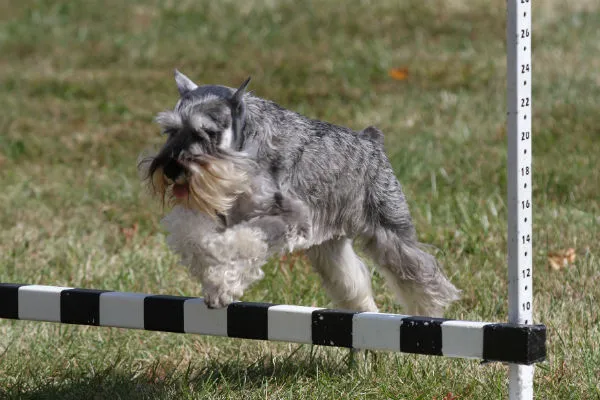 Miniature Schnauzer dog with classic beard and wiry coat
Miniature Schnauzer dog with classic beard and wiry coat
The Miniature Schnauzer is a smart, highly trainable, and cheerful little dog that strongly resembles its Standard Schnauzer cousin. This robust Terrier breed sheds very little, making them a popular choice among those seeking a low-shedding companion. Their adaptability allows them to thrive equally well in city apartments or country homes, as long as they are close to their human family. To maintain the distinctive appearance of Miniature Schnauzers, weekly brushing and regular professional grooming are essential parts of their care routine.
Poodle (Toy & Miniature): The Quintessential Hypoallergenic Breed
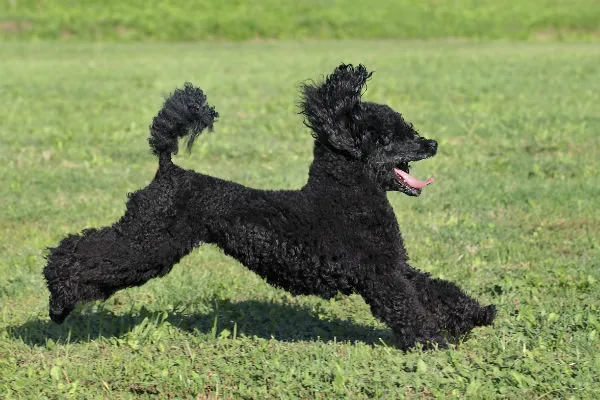 Poodle dog with curly coat looking elegant
Poodle dog with curly coat looking elegant
When people think of small breed of dogs that don’t shed, Poodles are often the first to come to mind, and for good reason. Poodles are renowned for being non-shedding and hypoallergenic. The Miniature and Toy Poodles offer these desirable qualities in petite, intelligent packages, differing only in size from their Standard counterparts. All Poodles are exceptionally intelligent, making them highly trainable. They are active, proud, and elegant dogs whose curly coats require regular professional grooming to prevent matting and maintain their iconic look.
Scottish Terrier: Bold, Confident, and Low-Shedding
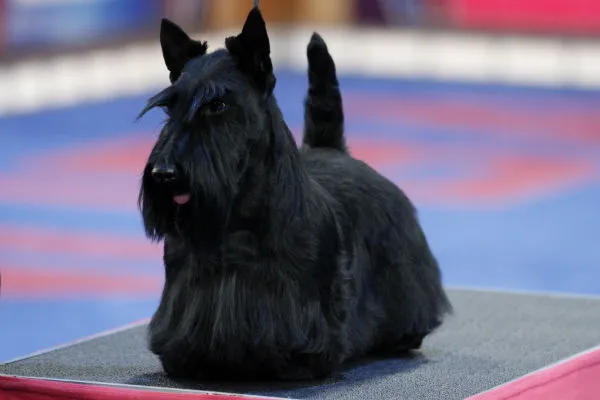 Scottish Terrier dog with distinct silhouette and wiry coat
Scottish Terrier dog with distinct silhouette and wiry coat
The Scottish Terrier, affectionately known as a Scottie, is a Terrier breed celebrated for its boldness, confidence, and distinct big personality. Their wiry, weather-resistant coat sheds very little, contributing to a cleaner home environment. However, to keep their coats healthy and maintain the breed’s classic outline, Scotties require regular brushing, professional grooming, and occasional hand-stripping. Scotties are clever and independent dogs with strong prey drives, so owners should be mindful when they are around smaller animals.
Shih Tzu: The “Little Lion” of Royalty
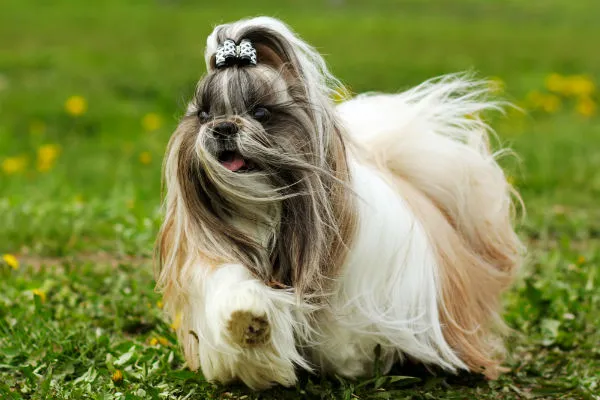 Shih Tzu dog with long, flowing hair and regal appearance
Shih Tzu dog with long, flowing hair and regal appearance
The Shih Tzu is another breed with a long and illustrious pedigree, once favored as house pets by the Tang Dynasty. These “little lion dogs” come in a captivating variety of colors and patterns. Their long, silky hair is very low-shedding and looks exceptionally regal when brushed out daily, truly befitting their royal ancestry. This Toy breed is surprisingly sturdy and lively, often described with an “arrogant” carriage due to their proudly held heads and curling tails. Shih Tzus were specifically bred to be cherished house pets, and their gentle, trusting nature makes them exceptional and devoted companions.
West Highland White Terrier: The Lively “Westie”
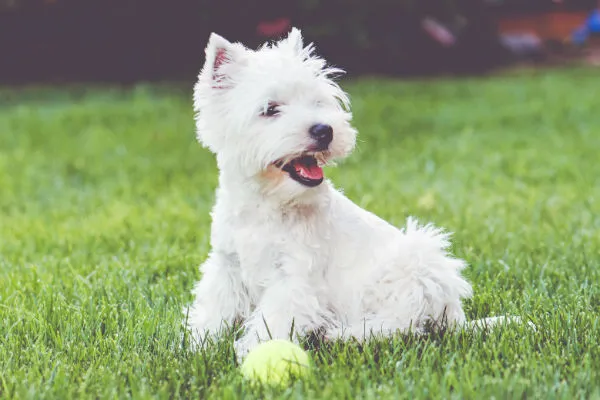 West Highland White Terrier dog with coarse white hair
West Highland White Terrier dog with coarse white hair
The coarse, bright white hair of the West Highland White Terrier, affectionately known as Westies, sheds very little. This sturdy and charming small dog breed that doesn’t shed is intelligent, loyal, happy, and highly entertaining. Westies are curious dogs with moderate energy levels, coupled with an independent streak common among all Terriers. This independent nature can sometimes make training a delightful challenge, requiring patience and consistency. Their cheerful disposition and robust health make them a popular choice for active families.
Xoloitzcuintli: The Ancient Mexican Companion
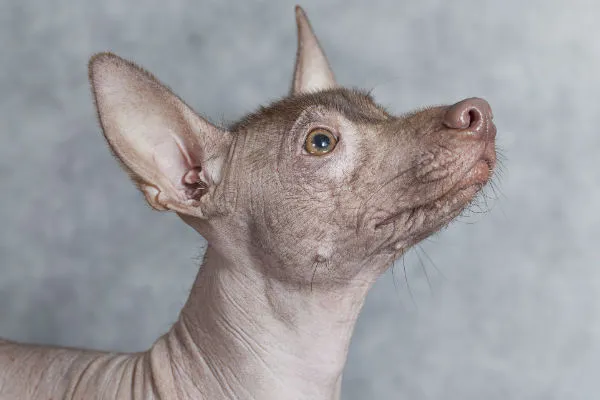 Hairless Xoloitzcuintli dog showing unique skin
Hairless Xoloitzcuintli dog showing unique skin
Also known as the Mexican Hairless dog, the Xoloitzcuintli is an ancient and rare breed available in hairless or coated varieties. The Hairless Xolo typically retains a small amount of hair on its head, while the coated variety possesses a very short, fine coat that sheds minimally. As with any hairless breed, Xolos require extra attention to their skin, including protection from sun exposure and cold weather. Xolos are known for being attentive watchdogs and affectionate companions. While they enjoy physical activities like walks and vigorous play, they are equally celebrated for their tranquil and calm personalities within the home.
Yorkshire Terrier: The Spirited “Yorkie”
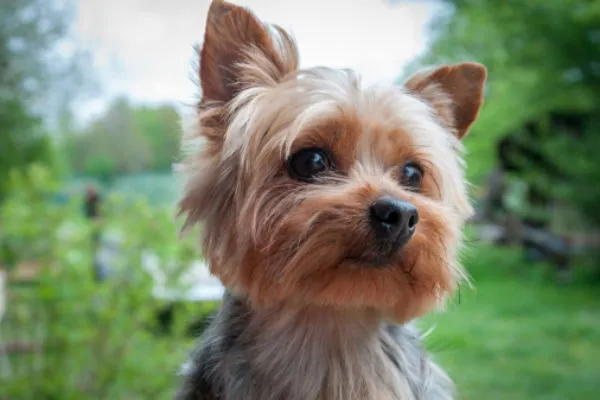 Yorkshire Terrier dog with silky coat and alert expression
Yorkshire Terrier dog with silky coat and alert expression
Sprightly, tenacious, and incredibly affectionate, the Yorkshire Terrier, often called the Yorkie, is a Toy breed brimming with personality. These spunky lapdogs are among the most popular dog breeds globally, and for good reason. Yorkshire Terriers do not shed, and their long, silky coats are stunning when brushed out daily, a task made easy by their petite size. Don’t be fooled by their regal appearance – Yorkies have working-class roots, originally hunting rats in English clothing mills. Today, they are just as content sitting on their owner’s lap as they are exploring or playing. For families interested in similar compact and charming breeds, exploring miniature cavalier king charles spaniel puppies for sale might offer additional choices.
Other Notable Low-Shedding Terriers
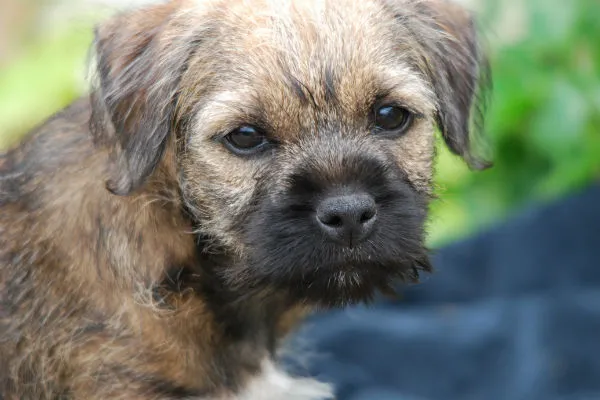 Border Terrier dog with wiry coat
Border Terrier dog with wiry coat
The Terrier group is a treasure trove of small dog breeds that don’t shed or shed minimally. Breeds with wiry and coarse hair, a common trait among Terriers, naturally shed less than many other coat types. This makes many Terriers ideal small dogs for individuals who prefer a cleaner home free from excessive shedding. Examples include breeds like the Border Terrier, Lakeland Terrier, and Norfolk Terrier, all of whom share the low-shedding characteristics of their more well-known relatives. If you’re looking into specific playful yet low-shedding breeds, you might find options like toy cavalier king charles spaniel puppies for sale.
Beyond Shedding: Essential Tips for All Dog Owners
While finding a small breed of dogs that don’t shed can alleviate a common concern, it’s crucial to remember that minimal shedding doesn’t mean zero maintenance. All dogs, regardless of their coat type, require dedicated care to thrive.
- Responsible Sourcing: Always acquire a dog from a reputable breeder or adopt from a trustworthy rescue organization. Responsible breeders prioritize the health and temperament of their puppies, providing early socialization and proper care.
- High-Quality Nutrition: Feed your dog a balanced, high-quality diet appropriate for their age, size, and activity level. Good nutrition is foundational to overall health, coat condition, and energy.
- Regular Veterinary Care: Schedule routine checkups with a veterinarian to ensure your pet stays healthy and to catch any potential health issues early.
- Consistent Grooming: Even non-shedding breeds need consistent grooming – daily brushing for long-haired breeds, regular baths, and professional trims to prevent matting and maintain skin health.
- Lifestyle Match: Take the time to carefully research any non-shedding dog breed to ensure their exercise needs, temperament, and personality truly align with your lifestyle and family dynamics.
By considering all aspects of dog ownership, you can find a wonderful, low-shedding companion that brings years of joy and companionship to your home.
